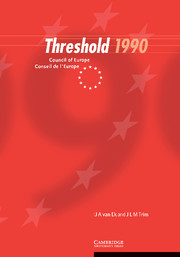Book contents
- Frontmatter
- Contents
- Preface
- Introduction
- 1 The objective: levels of specificity
- 2 The objective: general characterisation
- 3 The objective: extended characterisation
- 4 The objective: components of the specification
- 5 Language functions
- 6 General notions
- 7 Specific notions
- 8 Verbal exchange patterns
- 9 Dealing with texts: reading and listening
- 10 Writing
- 11 Sociocultural competence
- 12 Compensation strategies
- 13 Learning to learn
- 14 Degree of skill
- APPENDICES
12 - Compensation strategies
Published online by Cambridge University Press: 26 February 2010
- Frontmatter
- Contents
- Preface
- Introduction
- 1 The objective: levels of specificity
- 2 The objective: general characterisation
- 3 The objective: extended characterisation
- 4 The objective: components of the specification
- 5 Language functions
- 6 General notions
- 7 Specific notions
- 8 Verbal exchange patterns
- 9 Dealing with texts: reading and listening
- 10 Writing
- 11 Sociocultural competence
- 12 Compensation strategies
- 13 Learning to learn
- 14 Degree of skill
- APPENDICES
Summary
No matter how hard we try to assess and to predict learners' communication needs, to determine the situations requiring foreign language use which they are most likely to find themselves in, and to identify those language forms which are most likely to enable them to cope with these situations, there will always be a very broad margin of unpredictability. And even if the demands of a particular communication situation do not exceed that which the learners have been thoroughly prepared for, there are likely to be failures of recall, failures to activate, on the spur of the moment, certain items of knowledge or elements of skill that were acquired during the learning process.
This means that even if we confine ourselves to the requirements of everyday situations, unpredictable to a certain extent, the learner has to be prepared to cope with unpredicted demands as well as with failures of recall.
To some people skill in coping comes naturally. Somehow they manage, whatever their lack of skill or knowledge with regard to the ‘proper’ form of communication. Most people, however, will benefit substantially by being given ample opportunity, in the course of their learning process, to develop their skill in this respect. It is not primarily a matter of being ‘taught’ how to cope, but of being led to develop one's own strategies for doing so. Although certain strategies and techniques may almost certainly be beneficial to everyone, individual differences corresponding to differences in personality are to be given full scope.
- Type
- Chapter
- Information
- Threshold 1990 , pp. 103 - 106Publisher: Cambridge University PressPrint publication year: 1998

